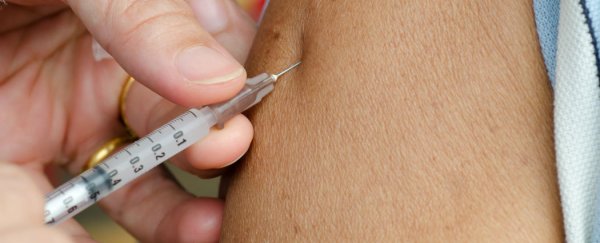For the first time ever, a malaria vaccine candidate has reached phase 3 of clinical testing. With just one phase of testing left to complete, this is the closest researchers have ever come to finding a successful vaccine for the disease.
The drug - with the catchy name, RTS,S/AS01 - was tested on almost 16,000 young African children. The children were selected from seven sub-Saharan African countries, including Burkina Faso, Gabon, Ghana, Kenya, Malawi, Mozambique and the United Republic of Tanzania. In sub-Saharan Africa, malaria kills around 1,300 children every day and there is currently no licensed vaccine available anywhere in the world.
The drug was found to be more effective when administered to toddlers rather than new-borns. Results published in The Lancet show the vaccine prevented infection in 46 percent of cases in children aged 5 to 17 months, compared with 27 percent amongst babies aged 6 to 12 weeks.
Phase 3 involved testing the children three years after receiving the vaccine with a booster dose in between. Phase 4 will pay close attention to whether the drug increases the chance of contracting meningitis. If it passes this stage, it can then go to market.
But there's a catch - the effectiveness of the vaccine decreases with time. When the children were tested four years after vaccination, the drug provided next to nil protection from severe malaria.
Still, the study's author thinks the drug could save a lot of lives. "Given that there were an estimated 198 million malaria cases in 2013, this level of efficacy potentially translates into millions of cases of malaria in children being prevented," said Brian Greenwood of the London School of Hygiene & Tropical Medicine in the UK, in a press release.
The study also found protection could be improved if the children were given a booster dose. If an infant received three doses of the drug plus a booster, their chances of contracting malaria at the four-year mark dropped by about a quarter. Without a booster dose, the drug didn't protect against severe malaria at all.
The other problem was side effects, with children who took the vaccine being more likely to suffer from convulsions and contract meningitis.
Professor Greenwood says the next step is getting the drug assessed by the European Medicines Agency (EMA). "If the EMA gives a favourable opinion, WHO could recommend the use of RTS,S/AS01 as early as October this year," he said. "If licensed, RTS,S/AS01 would be the first licensed human vaccine against a parasitic disease."
The World Health Organisation (WHO) have said paying for the vaccine could be the challenge, and that funds can't be redirected from other tasks including testing, treatment and prevention techniques such as mosquito nets. Either way, both teams are focussed on finding a cure for this deadly disease, with the hope of saving the lives of millions of children.
